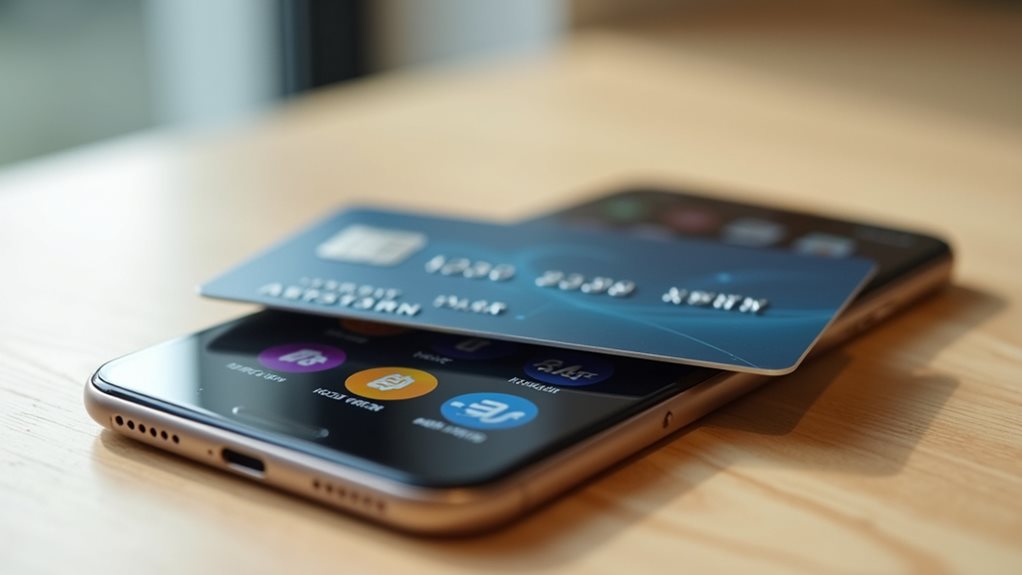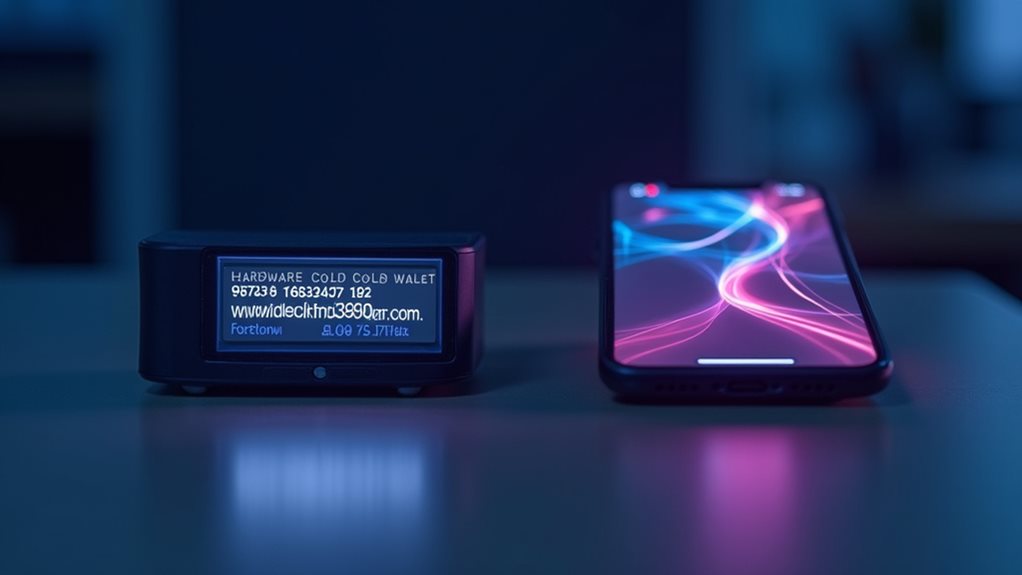Your crypto wallet choice depends on your priorities. Hot wallets (connected online) offer convenience but less security, while cold wallets (offline hardware) maximize protection but sacrifice speed. Custodial wallets let exchanges hold your keys—easy but risky. Non-custodial wallets give you total control but zero forgiveness if you lose access. Consider your trading frequency, portfolio size, and tech comfort level. The right choice means balancing your personal security paranoia with practical usability needs.
The Basics of Crypto Wallets: Hot vs. Cold Storage

When diving into the cryptocurrency world, you’ll quickly face a crucial decision: hot or cold storage for your digital assets.
It’s not merely tech jargon. It matters.
Hot wallets stay connected to the internet, giving you instant access to your crypto anywhere. Convenient? Absolutely.
Hot wallet benefits include easy trading and real-time transactions. Perfect for active traders who can’t wait.
Cold wallets work offline. They’re like digital fortresses—nearly hack-proof because they’re never online. Regular firmware updates keep your cold storage secure and protected against emerging threats. Their strength comes from keeping your private keys offline, making them significantly more secure against cyber threats.
But cold wallet risks are real. Lose that hardware device or forget your backup? Your crypto’s gone. Forever. No customer service hotline to save you.
The choice is simple: convenience versus security.
When it comes to your crypto, it’s always a tradeoff between easy access and bulletproof protection.
Most people need both. Active funds in hot. Savings in cold. Not rocket science.
Popular hardware wallets typically cost between $50 to $200 while most software wallets are free to use.
How Custodial and Non-Custodial Wallets Compare
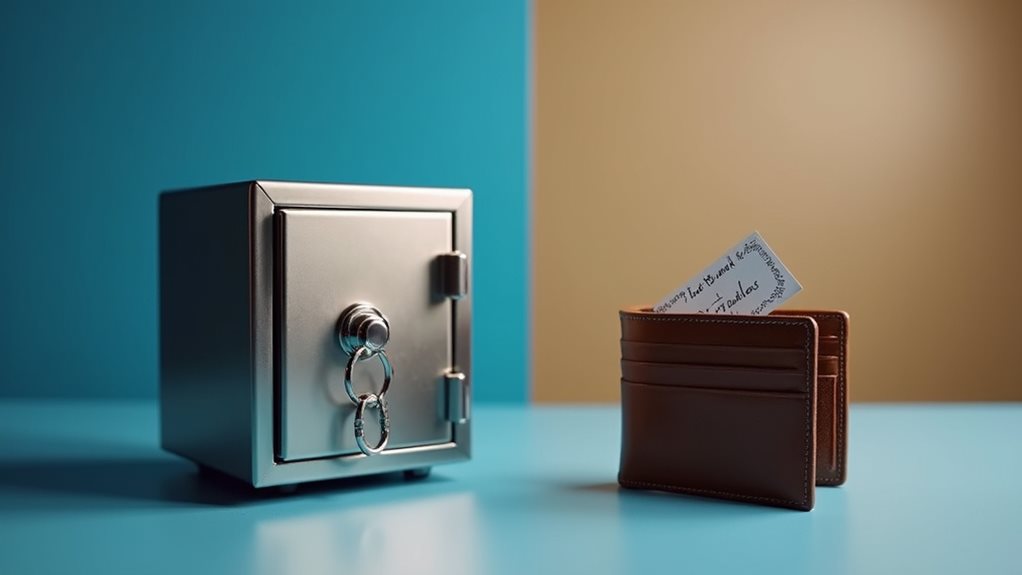
Beyond the hot-versus-cold decision, you’ll face another wallet crossroads: custodial or non-custodial.
With custodial wallets, someone else holds your keys. Convenient? Sure. But custodial risks are real—hacks happen, like that $90 million Liquid exchange disaster. Your coins, someone else’s server. Not ideal.
Non-custodial advantages are compelling: complete control, no KYC hoops, and superior privacy. Transaction speed is instant on-chain with non-custodial options, while custodial providers might process things internally first. Annoying. Non-custodial wallets also offer the security advantage of storing keys off-chain storage, making them significantly harder for hackers to breach.
User experience varies dramatically. Newbies often prefer custodial wallets’ slick interfaces and customer support. Custodial wallets typically provide better backup and recovery options if you lose access to your account. Veterans choose freedom over hand-holding.
Regulatory compliance? Custodial services jump through government hoops. Non-custodial? You’re flying solo—less hassle, more responsibility.
Your choice ultimately depends on whether you trust yourself more than institutions. Spoiler: institutions have spotty track records.
Security Essentials: Protecting Your Digital Assets
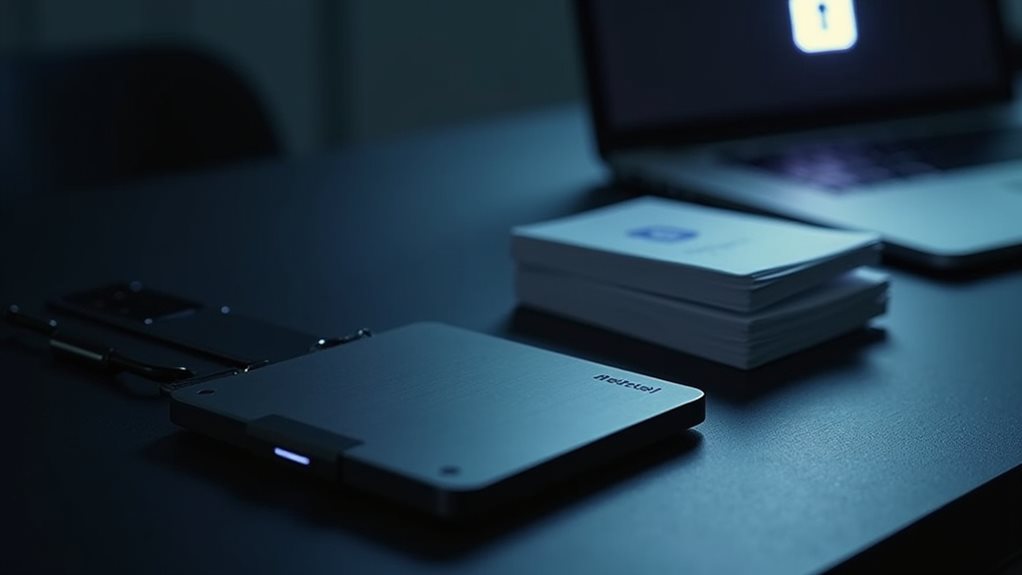
Security isn’t optional in the cryptocurrency world—it’s everything. Your private key management approach determines whether your funds stay yours or become someone else’s overnight. No joke.
Wallet security best practices start with encryption techniques like AES-256 and cold storage solutions that keep keys offline. Multi-factor authentication? Non-negotiable. Use it. Recent cases like Operation Crypto Runner demonstrate why robust security measures are essential for protecting digital assets.
Your encryption is only as good as your implementation. Cold storage plus MFA equals actually owning your crypto.
Digital asset protection requires regular software updates. Skip them and you’re basically inviting hackers to dinner. Not smart.
Cybersecurity awareness means backing up your wallet—completely and redundantly. Multiple copies. Different locations. Different media types. Implementing proper seed phrases is critical for wallet recovery if your primary device is lost or compromised.
Transaction monitoring keeps you alert to suspicious activity. Set up notifications. Check your wallet regularly. Consider using multi-signature wallets that require multiple keys to authorize transactions for an extra layer of security.
Remember: Hardware wallets beat software wallets. Offline beats online. And paranoia beats regret, every single time.
Top Mobile Wallets for Everyday Crypto Use
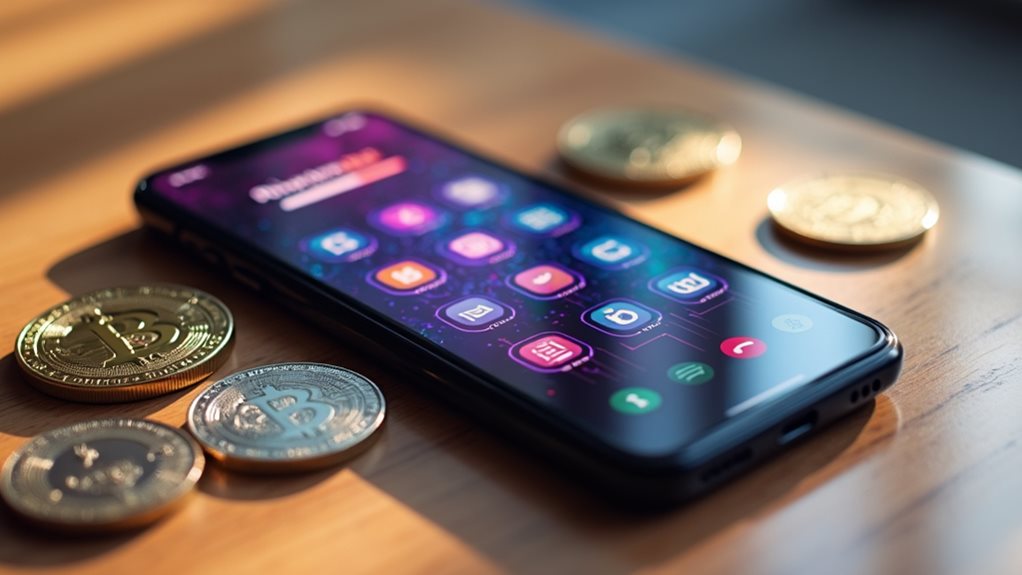
Despite all the talk about hardware wallets, your everyday crypto transactions demand something more accessible—right in your pocket.
Mobile wallets like Exodus, Trust Wallet, and ZenGo offer what you need: thousands of cryptocurrencies across multiple blockchains, all in one place.
The best mobile wallet features combine security with simplicity. No PhD required. You’ll get biometric authentication, real-time portfolio tracking, and the ability to stake coins directly from your phone. However, they lack the tamper-proof security that physical wallets provide against unauthorized access.
Earning passive income while waiting for coffee? Yes, please.
User experience matters. Period. That’s why these wallets offer intuitive interfaces that work for crypto newbies and veterans alike.
They connect seamlessly to exchanges, NFT marketplaces, and Web3 applications.
Need to buy crypto with a credit card? Done. Want to join a DAO? Easy.
These wallets generally fall into the hot wallet category as they maintain an internet connection for convenient access to your digital assets.
Hardware Wallets: Maximum Security for Long-Term Holders
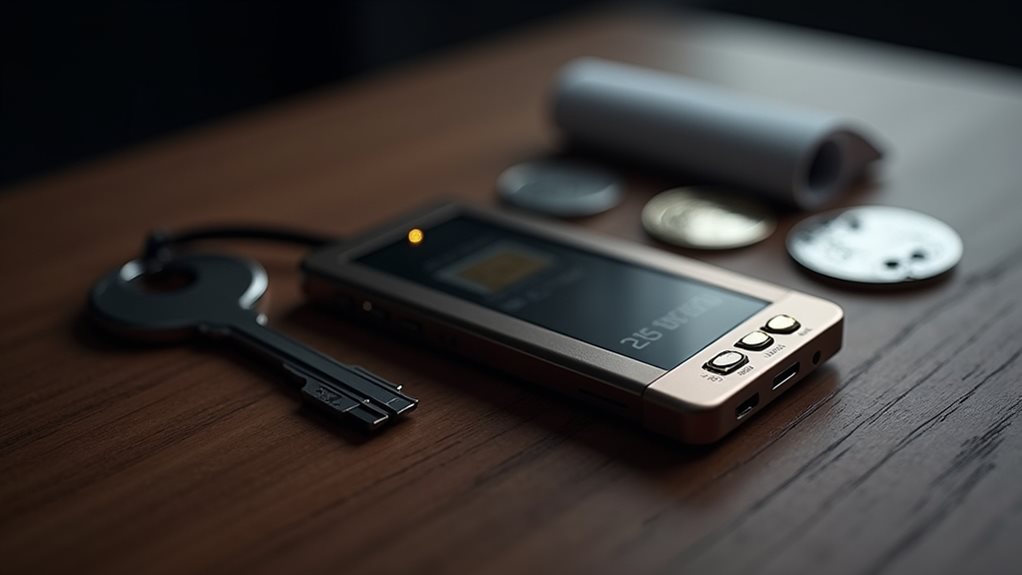
While mobile wallets shine for everyday transactions, hardware wallets represent the fortress your long-term crypto holdings deserve. These physical devices store private keys completely offline—untouchable by hackers lurking in your browser or Wi-Fi network.
The hardware wallet advantages are crystal clear. Secure element technology, the same tech protecting credit cards and passports, guards your crypto even if someone gets their hands on your device. You’ll sign transactions right on the hardware, not your vulnerable laptop. For superior security, experts recommend using hardware tokens to authorize any major transactions. The best hardware wallets support biometric authentication for an additional layer of security. The pioneer in this space, Trezor Model One, was first launched in 2014 by SatoshiLabs.
- Recovery phrases let you restore access if your wallet gets destroyed
- Private keys never leave the device—period
- Compatible with hundreds of cryptocurrencies and DeFi platforms
Let’s be honest—losing your recovery phrase means losing everything. Write it down. Twice. Your future self will thank you.
Browser Extensions and Desktop Options for Crypto Management
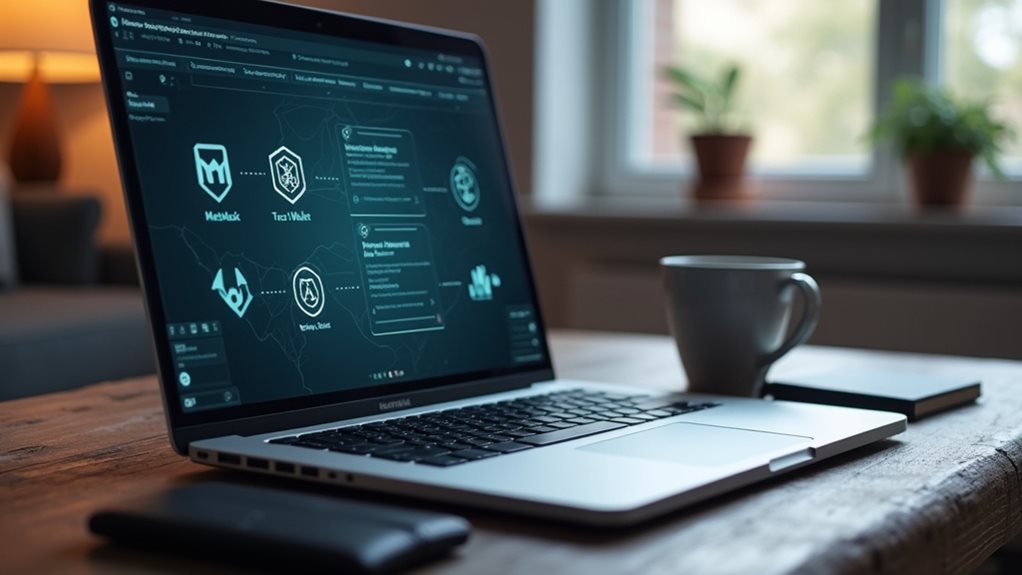
When your crypto expedition expands beyond occasional trading, you’ll need a wallet that fits seamlessly into your digital workflow.
Browser extension features like MetaMask’s 100M+ user base and Snaps functionality make daily crypto interactions stupidly simple. Trust Wallet gives you better swap prices. No-brainer.
Brave Wallet eliminates typical extension vulnerabilities—it’s built right into the browser. No third-party trust issues. Invigorating, right?
For desktop usability, Exodus shines with its intuitive interface supporting multiple chains. Exodus offers advanced security integration with hardware wallets like Ledger and Trezor. With the crypto wallet market projected to reach 19.03 billion dollars by 2025, more innovative options continue to emerge.
Perfect for crypto newbies and veterans alike. Most desktop options offer integrated exchanges so you can swap tokens without jumping through a million hoops. They’ve also got staking capabilities built in.
Cross-device sync is becoming standard too. Because who’s time to manage separate wallets everywhere?
Multi-Currency Support: Finding a Wallet for Your Portfolio

How many times have you juggled multiple wallets just to manage different coins? It’s ridiculous.
Today’s top wallets support hundreds—even thousands—of cryptocurrencies across dozens of blockchains. No more digital wallet chaos.
Multi-currency accessibility matters. Period.
Consider these features:
- Cold storage options that integrate with software wallets, like Trezor with Exodus
- Support for both mainstream crypto and obscure altcoins in one place
- NFT compatibility for your digital collectibles (because who doesn’t want cartoon apes?)
You’ll pay blockchain network fees, not wallet fees in most cases.
Some built-in exchange features charge small spreads—still cheaper than most exchanges.
The wallet doesn’t matter if you’re only hodling Bitcoin, but for actual portfolio management? Multi-currency support isn’t optional. It’s crucial.
MetaMask’s built-in Swap function charges a 0.875% commission on transactions while providing a user-friendly interface for trades.
Trust Wallet stands out with support for over 10 million digital assets and connectivity to more than 100 blockchains.
DeFi-Friendly Wallets: Features for Active Traders

Multi-currency wallets are great, but serious traders need more. DeFi wallet features now rival professional trading platforms. No intermediaries. More privacy.
Want to swap tokens fast? Hot wallets offer low-latency trades right in the app—perfect for catching those fleeting opportunities. DEX aggregators find you the best rates automatically. Nice. Smart contract security remains crucial for protecting your investments while trading.
Cross-chain compatibility is non-negotiable these days. Jump between Ethereum, Solana, and Polygon without switching apps. Your yield farming strategies shouldn’t be limited to one blockchain, right? Wallets like XDEFI support multiple chains including BTC and Thorchain, giving traders comprehensive ecosystem access.
Security matters when you’re active. Look for multi-factor authentication and self-custody. Because who needs another exchange collapse? Non-custodial design ensures you maintain complete control over your private keys while trading.
WalletConnect integration means you’ll access virtually any dApp. Staking, borrowing, lending—all from one interface. Trading’s complicated enough already.
Wallet Recovery Methods and Backup Strategies

Losing access to your crypto can be devastating—potentially permanent. Recovery challenges vary dramatically based on wallet type. Custodial wallets offer considerably better recovery odds (70-75% success rate) due to KYC data, while non-custodial risks are severe—lose your seed phrase and you’re probably toast.
- Backup strategies matter. Physical copies (paper, metal) protect against digital failure but can be lost or damaged.
- Seed phrase security is non-negotiable. Those 12 or 24 words are your lifeline. Multiple copies, geographically separated.
- Professional recovery isn’t magic. Success rates plummet when you have zero information about your password or seed phrase. Recovery services typically charge a non-negotiable fee of $500 for cryptocurrency recovery attempts.
Time is critical with theft—delays slash recovery chances. According to recent statistics, reporting theft within 24-72 hours significantly increases the likelihood of recovering stolen cryptocurrency.
And wallet recovery technology works best when you remember at least something about your credentials. Tough luck otherwise.
Choosing the Right Wallet Based on Your Crypto Goals
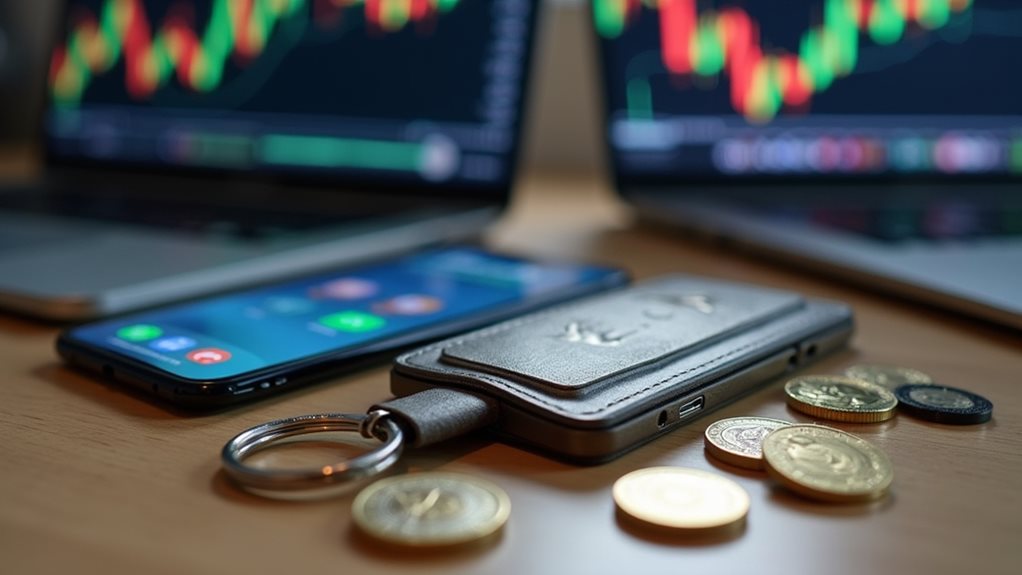
Selecting a crypto wallet isn’t just about security—it’s about matching your specific needs and goals. Your trading habits matter. Seriously.
For high-value, long-term holdings? Hardware wallets. No debate. They’re offline, unhackable (mostly), and worth every penny.
Daily traders need something different—mobile wallets with slick user experience and quick access. Always check for two-factor authentication when selecting a mobile wallet for an extra security layer. Cold wallets provide significantly enhanced security because they store your private keys offline. Trading during peak market hours between 2:30 PM and 4:30 PM UTC can maximize your opportunities.
Diversified portfolio? Grab multi-currency wallet features like those in Exodus.
DeFi enthusiast? MetaMask is practically mandatory.
Mining crypto? Consider wallets with zero-fee withdrawals.
Some people need convenience. Others demand control. The “not your keys, not your coins” crowd swears by non-custodial options, while beginners might prefer Coinbase’s training wheels.
Bottom line: match your wallet to your crypto lifestyle. A mismatch is like wearing flip-flops mountain climbing. Painful and stupid.
Frequently Asked Questions
Can I Have Multiple Wallets for Different Cryptocurrency Purposes?
Yes, you can implement a multi wallet strategy. You’ll benefit from purpose-specific wallets for different needs like trading, staking, or long-term storage. This approach improves security and helps organize your crypto assets effectively.
Do Crypto Wallets Charge Fees for Transactions or Storage?
Crypto wallets themselves typically don’t charge storage fees, but you’ll pay transaction fees to the blockchain network when sending cryptocurrency. Some wallets may add extra fees for in-wallet swaps or exchanges.
How Do Taxes Work When Using Cryptocurrency Wallets?
You’ll need to report all taxable events when using crypto wallets, including sales, trades, and purchases. Transfers between your own wallets aren’t taxable, but you must maintain records for accurate tax reporting.
Can Wallets Be Hacked Even With Proper Security Measures?
Yes, your wallet can be hacked despite proper security measures. Phishing, malware, and social engineering bypass wallet security defenses. Even multi-sig systems have vulnerabilities when multiple key holders are compromised or manipulated.
Are Crypto Wallets Regulated by Financial Authorities?
Yes, crypto wallets face varying regulation depending on type. Your custodial wallets are heavily regulated by FinCEN, SEC and CFTC, while non-custodial wallets face fewer direct regulations but aren’t completely exempt from crypto regulations affecting wallet security.

